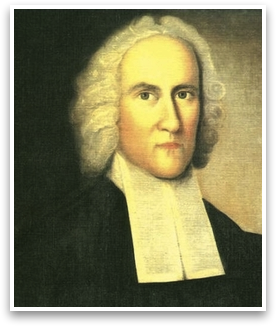
Jonathan Edwards
Jonathan Edwards was many things - philosopher, theologian, mystic, minister, scholar, father, and husband. He has also been greatly misunderstood.
A highly capable philosopher and rhetorician, Edwards is unfairly remembered by those only tangentially familiar with his work as a "fire and brimstone" preacher. A deep study, however, of Edwards' metaphysics, value theory, and epistemology easily disputes such simplistic misreadings.

Themes and Facts
- Admitted to Yale College at the age of 13, Edwards studied on average 13 hours a day.
- Ever devoted to perfecting himself, Edwards vowed "never to lose one moment of time, but to improve it in the most profitable way."
- Heavily influenced by the epistemology of John Locke, Edwards maintained that we must be personally moved by religous ideas and understand them experientially, not just intellectually.
- While best known for his sermon "Sinners in the Hands of an Angry God," Edwards was first and foremost a theologian of beauty.
- Like all Calvinists, Edwards maintained a belief in the full and absolute sovereignty of God.
Study Questions
- Edwards famous sermon "Sinners in the Hands of an Angry God" is perhaps one of the most mis-interpreted and mis-understood aspects of his work. How is it that the God of beauty, light, and love Edwards describes in "Personal Narrative" can be the same God of anger and retribution in "Sinners"? How does the genre (i.e. a sermon delivered by guest preacher) help understand the sermon better?
- What rhetorical strategies does Edwards use in the "Sinners" sermon? Why were they so effective?
Although the sermon "Sinners in the Hands of an Angry God" is a rhetorical masterpiece, it is indeed unfortunate that Edwards is popularly known for this occasional though powerful homily. Not a fire and brimstone evangelist, Jonathan Edwards was a first-rate philosopher and theologian who concentrated more on the beauty and sovereignty of God than God's wrath.